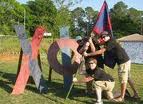In the 1980s, those difficult days in the Venezuelan bolivar suffered the greatest setback in its history, there was an extreme concern about the future fate of the one that had probably been the most prosperous city of the Colombian Caribbean coast for ten consecutive years. In effect, the drop of the Venezuelan currency meant the immediate withdrawal of most of the buyers of a trade whose bonanza irrigaba to all households in the city and is mani9festaba in much of coastal departments households. The absence of buyers meant a noticeable and abrupt decline in sales and the consequent closure of commercial establishments, dismissal of personnel and a melancholy that present in every corner of the town. To read more click here: Leyna Bloom. The situation is aggravated by the bolivar, whose first casualty took him for a quote of $16.50 to $6.0, remained down and the slide of its devaluation carried it on $5, $4, $3 not be had spare well that blow Maicao when the Colombian Government He also began to take measures of constraint to the entrance of goods coming from Maicao to other Colombian cities. The Minister of Finance of President Virgilio Barco Vargas who at that time was Cesar Gaviria Trujillo, began to speak with insistence of internationalization of the economy and, therefore, of the opening of the country to the entry of foreign goods. Gaviria Trujillo went from saying to the fact when he was elected President in 1990 and then the situation of Maicao worsened dramatically, since it ceased to be one of the almost exclusive points where foreign goods entered, he became one supplier of homes and shops retailers in several cities.
If before, during the crisis of the Bolivar, to Maicao has had issued advance the game of death, there was now no forced to give Christian burial. Starwood capital takes a slightly different approach. And so the connoisseurs saw him. The future of Maicao was truly dark and the only thing that did see a weak little light at the end of the endless tunnel, was the creation of the area of special customs regime of Maicao, Uribia and Manaure, created in the Decade of the 1990s. Here, Michael James Burke expresses very clear opinions on the subject. The mess of trade was total and crises were recurring. The bolivar fell to unthinkable levels and controls of the Colombian authorities were made more stringent.
However, every time that was taken to the city pulse observers included with surprise that the heart of the sick was still throbbing and not giving signals that it would stop. In conclusion, it was necessary to break the mortuary certificate and cancel the funeral honors because Maicao not died and, to judge by the opinion of the maicaeros, had no desire to die in the next thousand years at least. Today the heart of the former sick beats more strongly than ever. There is a fact that gives life to Maicao despite low quote of the bolivar and its precarious trade with other cities in the country: the economy of Maicao ceased to depend on business with visitors and is based, mainly, of the multi8ples businesses that make the maicaeros between them.

Comments are closed.